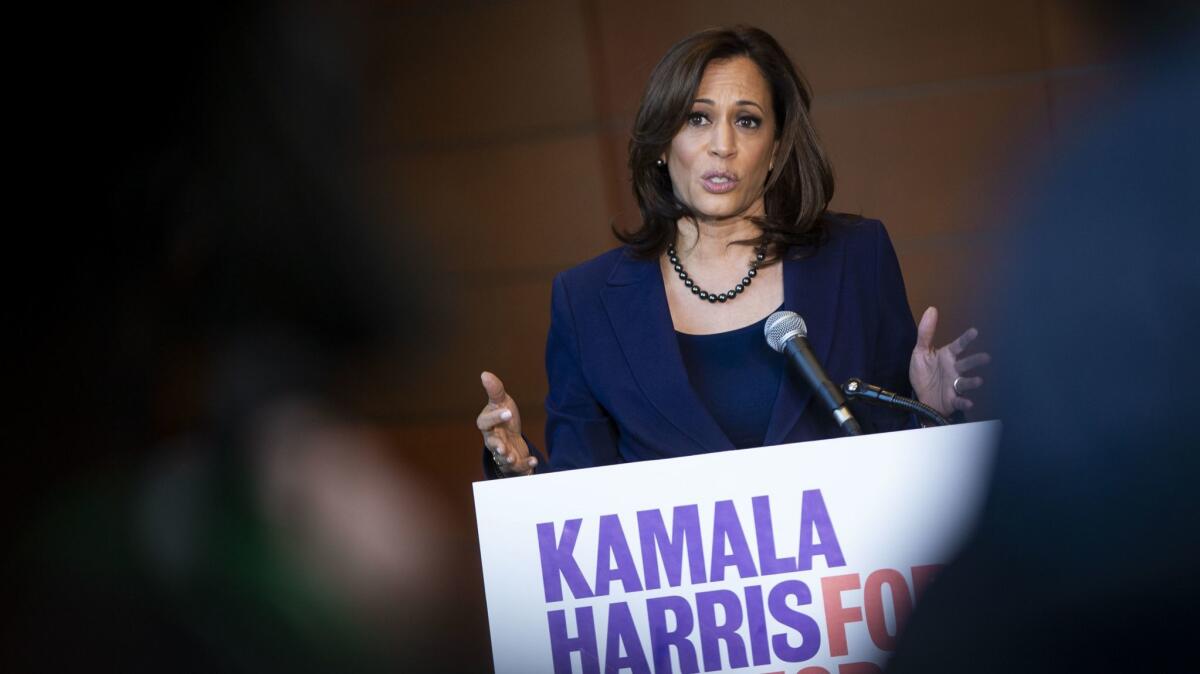Capitol Journal: Sen. Kamala Harris can’t ‘fight for the people’ if she stays silent

Reporting from Sacramento — California Sen. Kamala Harris promises to “fight for the people” if she’s elected president. She hopes to catch fire with Democratic liberals.
The word “fight” was mentioned four times in her brief prepared announcement of candidacy Monday. “The American people need someone who is going to fight for them,” she proclaimed.
But her rhetoric doesn’t match the record.
Liberals — or progressives, whatever you want to call them — may be disappointed if they look closely at Harris’ tenure as state attorney general. She wasn’t exactly a firebrand crusader for progressive causes when the slogging got tough.
Harris’ most striking failure to lead was her refusal to take a stand on two separate ballot measures to repeal California’s broken, expensive death penalty that exists in name only.
California hasn’t executed anyone since 2006, and only 13 in the last 40 years. As of last month, there were 741 convicted murderers stacked up on San Quentin’s death row. The primary cause of death for California’s condemned killers is old age.
So whatever anyone believes about the morality of capital punishment, California’s system of nonexistent executions is a huge waste of tax money for the special treatment of first-degree murderers.
In 2012 and 2016, there were initiatives on the ballot to repeal capital punishment and move everyone off death row to the general prison population for life without the possibility of parole.
Harris declined to take a position on either. The first proposal failed narrowly by 4 percentage points, the second by 6.4.
In 2016, there was a contrasting initiative sponsored by law enforcement groups to expedite the death penalty. Harris stayed neutral on that proposal, too. It passed by 2.2 points.
Harris had a nice-sounding rationale for remaining on the sidelines: The attorney general has the ministerial duty of writing the official title and summary for ballot propositions.
If she were to take sides on a measure, the argument goes, it could taint her title and summary in voters’ minds. Moreover, it might provide grounds for a lawsuit contending that the author of the measure’s description was biased.
Nonsense. If the title and summary are biased — and they increasingly seem to be that way — they’re likely to be challenged in court, regardless of the attorney general’s political position. Unfortunately, Harris’ successor, Democratic Atty. Gen. Xavier Becerra, also is remaining neutral on ballot measures. As did Harris’ predecessor, Jerry Brown.
But prior to Brown, all the attorneys general took positions on propositions and wrote fairly straight-shooting descriptions of them.
After all, an attorney general is elected by the people to not only be the state’s chief law enforcement officer, but to point the way on law enforcement and lead.
A governor — or president — doesn’t always remain neutral on legislation, claiming he shouldn’t show bias because he may eventually have to sign or veto a measure. Sometimes he embraces a bill and fights for it.
Clearly, Harris’ motive in not fighting for the death penalty repeal was that she wanted to avoid making political enemies. California voters always have been torn about capital punishment.
But more than that, an attorney general relies on a good relationship with law enforcement. And most police chiefs and sheriffs support the death penalty. Harris was politically ambitious.
Coverage of California politics »
Gov. Jerry Brown didn’t support the repeal measures either, although a failed fight to abolish capital punishment was what first got him into politics when his father was governor in 1960.
As lieutenant governor, Gov. Gavin Newsom supported both death penalty repeals.
“It frustrates me no end,” Newsom told me in 2015, referring to those politicians who didn’t utter a peep. “I get the politics, but ...”
Brown, when asked last month why he didn’t endorse the ballot measures, told the Sacramento Press Club that “the essence of leadership is knowing when to hold and when to fold, when to move forward and when to stay still.”
What the termed-out governor didn’t say was that in 2012 his “soak the rich” tax increase was on the ballot, and in 2016, he was pushing a proposition to overhaul criminal sentencing by reducing prison time and allowing earlier parole for inmates who behaved. He calculated that thrusting himself into the death penalty fight might jeopardize those efforts.
Harris talks about the need for criminal justice reform, but she didn’t support Brown’s sentencing rollback, Proposition 57, which voters approved. She took no stand. Same thing in 2014 with Proposition 47, which reduced several felonies to misdemeanors. It also passed.
Come on! An attorney general should speak up on important law-and-order proposals.
As San Francisco district attorney — in the most liberal city of the most liberal state in the nation — Harris implied that abolishing capital punishment was one of her most fervent causes. Running for office, she promised to never seek the death penalty. And she didn’t, even when a gang member gunned down a cop. She considered the death penalty unjust and immoral.
Lara Bazelon, a law professor and former director of the Loyola Law School Project for the Innocent, wrote in a New York Times opinion piece last week: “Time after time, when progressives urged her to embrace criminal justice reforms as a district attorney and then the state’s attorney general, Ms. Harris opposed them or stayed silent.”
It’s not fighting when you stay silent.
Follow @LATimesSkelton on Twitter
More to Read
Get the L.A. Times Politics newsletter
Deeply reported insights into legislation, politics and policy from Sacramento, Washington and beyond. In your inbox three times per week.
You may occasionally receive promotional content from the Los Angeles Times.











